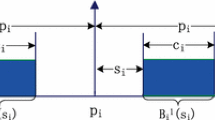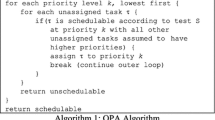Abstract
A new feasibility test for preemptive scheduling of periodic or sporadic real-time tasks on a single-queue m-server system allows for arbitrary fixed task priorities and arbitrary deadlines. For the special case when deadline equals period and priorities are rate monotonic, any set of tasks with maximum individual task utilization umax and minimum individual task utilization umin is feasible if the total utilization does not exceed \(m(1-u_{\rm max})/2 + u_{\rm min}\).
Similar content being viewed by others
References
Andersson, B., Baruah, S., and Jonsson, J. 2001. Static-priority scheduling on multiprocessors. In Proc. 22nd IEEE Real-Time Systems Symposium, London, UK, pp. 193–202.
Baker, T. P. 2003a. An analysis of deadline-monotonic scheduling on a multiprocessor. Technical Report TR-030301, Florida State University Department of Computer Science, Tallahassee, FL.
Baker, T. P. 2003b. Multiprocessor EDF and deadline monotonic schedulability analysis. In Proc. 24th IEEE Real-Time Systems Symposium, pp. 120–129.
Baruah, S., and Goossens, J. 2003. Rate-monotonic scheduling on uniform multiprocessors. IEEE Trans. Computers 52(7): 966–970.
Dhall, S. K., and Liu, C. L. 1978. On a real-time scheduling problem. Operations Research 26(1): 127–140.
Liu, C. L., and Layland, J. W. 1973. Scheduling alghorithms for multiprogramming in a hard real-time environment. Journal of the ACM 20(1): 46–61.
Lopez, J. M., Diaz, J.L., and Garcia, D. F. 2001. Minimum and maximum utilization bounds for multiprocessor RM scheduling. In Proc. 13th Euromicro Conf. Real-Time Systems, Delft, Netherlands, pp. 67–75.
Lopez, J. M., Diaz, J. L., Garcia, M., and Garcia, D. F. 2000. Worst-case utilization bound for EDF scheduling on real-time multiprocessor systems. In Proc. 12th Euromicro Conf. Real-Time Systems, pp. 25–33.
Lundberg, L. 2002. Analyzing fixed-priority global multiprocessor scheduling. In Proc. 8th IEEE Real-Time and Embedded Technology and Applications Symposium, San Jose, CA, USA, pp. 145–153, IEEE Computer Society.
Oh, D. I., and Baker, T. P. 1998. Utilization bounds for N-processor rate monotone scheduling with stable processor assignment. Real Time Systems 15(2): 183–193.
Phillips, C. A., Stein, C., Torng, E., and Wein, J. 1997. Optimal time-critical scheduling via resource augmentation. In Proc. 29th Annual ACM Symposium on Theory of Computing, El Paso, TX, pp. 140–149, ACM.
Sha, L., Abdelzaher, T., Årzén, K. E., Cervin, A., Baker, T. P., Burns, A., Buttazzo, G., Caccamo, M., Lehoczky, J., and Mok, A. K. 2004. Real time scheduling theory: A historical perspective. Real-Time Systems 28(2/3): 101–155.
Author information
Authors and Affiliations
Corresponding author
Additional information
Ted Baker received the Ph.D. in Computer Science from Cornell University in 1973. He is a Professor in the Department of Computer Science at the Florida State University, which he chaired from 1998 to 2005. After spending several years doing research in computational complexity theory, he moved on to more practical aspects of computing and has worked in the area of both Ada compilation and real-time systems for the last two decades. A group he organized at FSU in 1979 produced one of the first validated Ada cross-compilers for embedded systems. Since then, he has done research, development, and consulting related to real-time embedded computing, from basic research on scheduling and concurrency control through development of kernels and run-time system support for real-time programming languages. He has also been active in IEEE (POSIX) and ISO standards work related to real-time systems. Dr. Baker was a member of the SEI Rate Monotonic Analysis group, served as real-time area expert for the Ada 9X language mapping and revision team. He directed the FSU teams that developed several software products, including the FSU POSIX threads library, the Florist implementation of IEEE Std 1003.5b-c (the POSIX/Ada API), a set of validation tests for the 1003.5b standards, and the multitasking run-time system for the Gnu Ada (GNAT) compiler. He directed the porting of the latter to several environments, including the Java Virtual Machine and RT Linux. His current research interests are real-time multiprocessor scheduling and real-time device driver architecture.
Rights and permissions
About this article
Cite this article
Baker, T.P. An Analysis of Fixed-Priority Schedulability on a Multiprocessor. Real-Time Syst 32, 49–71 (2006). https://doi.org/10.1007/S11241-005-4686-1
Published:
Issue Date:
DOI: https://doi.org/10.1007/S11241-005-4686-1




